INDIA
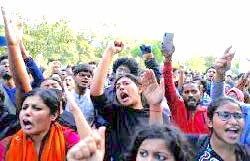
Madhu was seventeen when she came to New Delhi to enroll at the Jawaharlal Nehru University (JNU). She grew up in a remote village with no electricity, toilets or running water. Her father, a day worker with a family of six, borrowed money so Madhu could get an education and bring fame and prosperity to the family.
That dream was shattered when the government proposed increases of 400% in tuition and 600% in boarding fees. Instead of returning to her village, Madhu joined thousands of students to protest the fee hikes, confronting police armed with teargas, water cannons and live ammunition.
As the student protest grew bigger, the repression from police escalated. But the students were not intimidated. Protests spread to other cities, drawing in even more students, professors and staff. Tens of thousands of students defying police barricades and marching to the parliament inspired many others. Messages of support and solidarity came from South Africa, Pakistan, Bangladesh and Chile.
What started as a protest against fee increase began to question the role of education itself. For thousands of students, going to a classroom and listening to their professor made no sense. Large gatherings of thousands singing, cooking, making plans for protests, and raising banners day and night created learning that does not exist in a classroom.
The government tried desperately to end the student protest. December is the month of final exams. The JNU administration threatened to expel and cancel students’ scholarships if they did not take the exams. Many professors have refused to conduct exams.
Our fight is spreading and so are the opportunities to spread revolutionary communist ideas. Last week over 5000 ad-hoc faculty of Delhi University (DU) took over the central offices of the vice chancellor. We are spreading our ideas to faculty and staff at DU.
A former student of JNU found Red Flag four years ago on social media. When the JNU student protests erupted, he brought some students there a copy of the ICWP pamphlet on communist education. Madhu was among those who received our literature.
A small group of students started discussing Red Flag and the pamphlet. We discovered that many ministers in the fascist Modi government as well as reformist, fake communist leaders of CPI and CPM were graduates of JNU.
We talked about education to end violence against women, education to smash religious violence, to end poverty, to clean the air that is choking people in Delhi. This kind of education doesn’t exist in capitalism because it is based on profit. We need a communist society.
We had lively discussions with the students. What started as a protest against fees has become a school for questioning capitalism and its exploitation of the working class.
Capitalist education perpetuates the ideology that greed is human nature and cannot change—rather than the result of the profit system. Our experience in the mass student protests has taught us otherwise. In the street battles when some students become targets of police beating, teargas or water cannon, we all rush to help our comrades.
In communist society, when there is no profit motive, everyone will be educated. But this education will not be in the exclusive areas that we call universities. It will be in the factories, the neighbourhoods and in trains, buses and streets. Education will no longer be an individual endeavor of going to a classroom, taking a test and doing the same task defending capitalism for all our life. Communist education will come from our need to rebuild the society left in shambles by environmental disasters, wars and religious ignorance and hatred. This education of collective struggle and learning will be for all.
In one of the demonstrations, our friend and comrade Madhu got a direct blow to her head from a police baton. Blood rushed down her face, but she stood defiantly. In a moment of agonizing pain, she showed her determination that the fight was no longer to roll back the fee increase. It is a fight win a world without capitalism. When her father saw Madhu’s picture, he said, “She is bringing us the hope that we need in order to change this society.”
SOUTH AFRICA
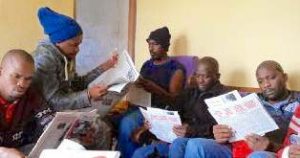
In November, comrades from Port Elizabeth went to Rustenburg, a mining center where a mass strike in 2012 exposed the African National Congress’ betrayal of the working class. We have been uneven in our visits to this mining center, 1100 km (700 miles) distance from our party center in South Africa, but we decided it was important to be more consistent in our contacts with miners and to guarantee the development of ICWP in the region.
The day we arrived, we met two miners who were staying in the same place. We don’t speak the local language, Sitswana, so we reverted to English. We said that we were from Port Elizabeth and that we wanted to meet miners and talk to them about communism.
The next day we distributed over 100 copies of Red Flag, mostly outside the hostels around the mines. However, it was hard to have meaningful conversation because workers were rushing to catch a transport for home.
The next day we went inside the hostels and were able to have better conversations. Most of the miners complained about the conditions. Workers stay in informal settlements even today. There are no roads, no houses. Workers still don’t have access to water. Entire neighborhoods are using one tap of water.
They can see that five years after the massacre nothing has changed. The unions are not living up to their promises. The workers ask, “If you say that unions are bad, what is it that you can offer that is better than the unions?” “What is it that you can offer now in the present?”
We talked about something that was not familiar to them: that it is imperative to abolish money. The only thing that ties workers to the bosses are wages. We need to exchange our labor for wages, and then exchange those wages to fulfill needs. If we destroy money and wages and provide for the workers needs, we will be breaking the chain of wage slavery that binds workers to the bosses.
That is the only way to liberate the working class. You can’t liberate the working class by building more clinics, more police stations, more schools. We are still tied to the bosses through wages. We need to break these chains. The reason there is poverty, unemployment, corruption, the reason people are sick—is because of the money system.
We explained that we are sold some toxic things that make us sick, with diabetes, etc. They sell them to us because of profit, to the detriment of our health. In communism, we would make sure that people don’t get sick in the first place. In communism, things we eat that make us sick will be abolished. Our message got through to some of them.
In our last day, the comrades who form the nucleus of the new collective in Rustenburg came to the mobilization. They helped distribute Red Flag for the first time and got some experience interacting with workers on the street. This will prepare them to distribute Red Flag for themselves in the future.
The trip to Rustenburg also helped make the comrades from Port Elizabeth more committed and better leaders and organizers for the party. We learned how to better anticipate problems, whether it’s for accommodation or transport, to come up with remedies before they arise. We learned that we had to rely on other comrades in the collective to make sure that we had everything we need.
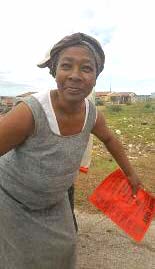
FRANCE
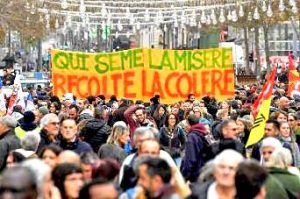
“He who sows misery, reaps anger” in mass protests against attacks on workers’ pensions.
COLOMBIA
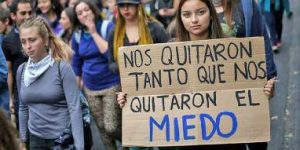
“They took so much from us that they took away our fear.”

